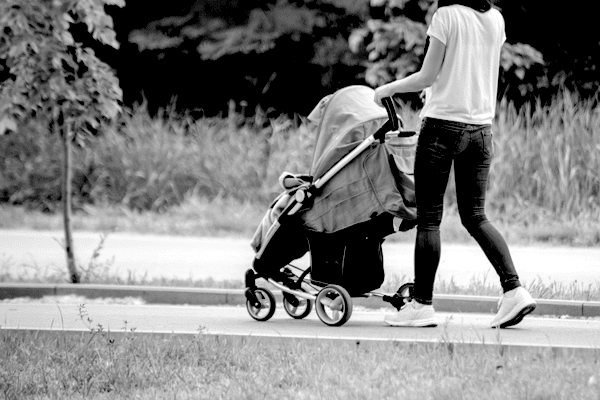As I shut the last car door, I heard a man yelling. Not a ‘having fun in the park’ sort of noise, but a scary, ‘lock your doors’ sort of yelling.
I looked up and saw a man storm off and a woman, holding a toddler, walking near me towards the play equipment. She was visibly shaking. Terrified. I nearly got in my car. I had to get the girls home. It was late.
But of course I couldn’t. I called out to the woman and asked if she was ok.
Lucy* burst into tears. She had recently moved in with her partner and couldn’t afford the place without him. She had moved to Brisbane and didn’t have work.
Her partner was violent towards her physically and verbally. She had a current Domestic Violence Order (DVO) against him but had been really apologetic for his behaviour recently.
She was too scared to go home. She didn’t have any family. She didn’t know about shelters. She was worried the police would take her daughter away from her. She is also 31 weeks’ pregnant.
We talked for a while and I tried to share some options with Lucy before she agreed we should call the police.
I did, and to be honest, I was getting pretty nervous after 15-20 minutes – it was nearly dark, both our babies had started grizzling and finally, the police arrived. Initially two male officers, and then a second car with a female officer. They were kind and compassionate, but it was clear they had ‘seen it all before’.
I stayed until Lucy was comfortable and the officers assured me that they would take her home and get warm clothes and supplies and ensure she had somewhere safe to stay that night. The phrase ‘that night’ stayed in my mind all weekend.
What about the next night, and the one after that?
‘There’s nothing more you can do’ was what I was told.
Really?
I share this story for a few reasons. The first is to be honest about how close I was to not reaching out, to driving away because it would have been easier and because of my instinct to protect my own children. And I am someone with formal, first responder training. I can only imagine how many times we see these issues in our community and turn a blind eye.
The second is because violence against women is happening all around us and the victim survivors are the women beside us at the park or sitting next to us at work. Just last month, new figures show there have been almost 500 prosecutions for choking, strangulation or suffocation in a domestic setting since the offence was introduced in Queensland three years ago.
And this month, new data from the Bureau of Crime Statistics and Research reveals NSW domestic violence murders doubled over the past year. Like it or not, we are all bystanders to violence against women.
The third reason I share this experience is because as I left Lucy on Friday night, in the hands of three very kind police officers, I had absolutely no confidence that she would be safe.
I am not confident she will be able to access safe housing, or that financial security for a young, pregnant mother will not take her back to her violent partner.
I am not confident that the DVO against this man will deter him from further violence. None of that is because of the actions of the police: it is due to the systemic under-resourcing of the domestic violence sector.
All state and territory governments and the federal government have made commitments to work harder to prevent and respond to domestic and family violence. In the lead up to the federal election, the Government announced significant funding for the domestic and family violence (DV) sector, recognising that increasing access to emergency accommodation was a high priority.
However, this funding needs to be matched by the states and territories if it is going to be able to provide a scale of support that comes close to matching demand. Increased funding is required to ensure that a proper case management process is in place, supporting women to navigate through the accommodation, legal and financial challenges they face when they are escaping domestic and family violence.
As a community, we need to find a better solution to domestic violence. There is always something more we can do. I have set up a monthly donation with my local DV crisis support service – there is one in each state and territory that you can support.
We need to actively advocate for long-term, predictable and significant funding to be allocated to the services that keep women safe. This investment should be coupled with work focused on attitudinal change and the advancement of gender equality – but this will take time.
Never underestimate the power of writing to your local MP.
Our workplaces should be safe. The QLD Government has advice online for any employer wishing to provide support to employees who may be impacted by domestic and family violence. These resources can be adapted to any sector and any sized organisation. Simply having a conversation in the workplace about DV and letting employees know that they can seek assistance could save a life.
We need to commit to being a stronger community. Leaning towards someone in trouble, not away. Every time.
I spent the entire weekend thinking about Lucy and how casually I thought ‘it’s Friday I survived another week’ and just how different our definitions of ‘survival’ are.
Lucy didn’t have a scooter, pram and nappy bag to pack into a safe, warm car. She had her daughter and she was clutching a squishy toy, keys and her phone.
*Names have been changed to protect the individual
If you or someone you know is impacted by sexual assault, domestic or family violence, call 1800RESPECT on 1800 737 732 or visit www.1800RESPECT.org.au


